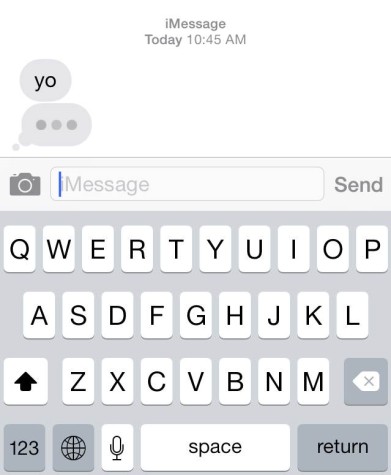Bubbles of Anxiety
September 16, 2014
You have waited a terribly long three minutes to receive a reply to your maybe banal, possibly flirty, a little courageous, or heavily risk-taking text. The three little gray dots sporadically appear and disappear, and you keenly sense a sentiment of nervousness and haphazardness from the opposing side. Countless of questions arise in your head, and a surge of embarrassment, insecurity, and annoyance rush through your back. These three gray-gradient dots called “typing awareness indicators” signify the process of your texting partner composing a text message. Anxiety arises as you see the ellipses showing up and then disappearing, with no reply from your friend. This form of anxiousness has actually been diagnosed as one of the myriad of psychological problems that come from overdependence on technology, specifically with respect to the iPhone.
These typing awareness indicators come in multiple formats. On an iPhone, the bubble appears when you’re messaging another iPhone user; on Google Chat or Facebook Messenger, you’ll receive a “Rachel is typing…” blurb. These three seemingly insignificant dots actually carry much weight to the conversations that are held because they provoke curiosity of what is going to be said and unease for the possibility of a lack of reply.
Professor Paul Dourish from the University of California, Irvine says that “the awareness indicator as implemented on the iPhone is a curious beast— it conveys that something is being done, but it won’t say what”. Beyond the ellipses, read receipts have served as a topic of contentious debate. Some regard these indicators as an invasion of privacy, and others heavily assert the need of these signals on the matters of efficiency.
The truth is that people simultaneously feel reluctant to activate their own read receipts, while they appreciate respondents having theirs on. Where does this reverse psychology originate from? Technology has so heavily impacted human social expectations and responsibilities. Social media has caused us to crave to learn more about what others do and enjoy, while has made us feel both inferior and stressed in demanding us to show more of ourselves, and not necessarily our true selves but our good selves.
We are over-calculating and over-dependent on these contextual clues that should merely be used as tools for more efficient communication. But, we have taken these signals to an extreme level, attempting to analyze the psychology of a friend in the virtual world and playing the economic game theory with sending a second text for reassurance or waiting another five minutes for the enigmatic ellipses to be replaced by a firmer reply.
Whether you turn these “typing awareness indicators” on or off, I think that these contextual clues demand more social responsibility out of individuals of the present and future generations. These signals demand for more respect of individuals’ private spaces and should train people to be more tolerant and understanding. Although we may already be aware that the person has read the message, we need the extra second of patience to respect the private circumstances of individuals, situations that we often so easily neglect or regard as unimportant.




























